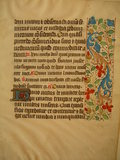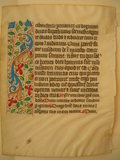Cleveland Institute of Art Leaf 46
This leaf is from a Book of Hours made in northern France in the late fifteenth century. It measures 16 x 12 cm, and the arrangement of its responses and antiphons indicates that it accords with the Use of Rouen. Blooming on these pages are acanthus leaves intertwined with a truly impressive variety of what Ege calls "wayside flowers," including thistles, gallic roses, strawberries, grapes, and others which are so stylized as to be nearly geometric. The flowers are fenced in by red lining, a thinner form of which rules the text. There are many well-executed illuminated initials, with lesser first letters filled with yellow; occasionally a lone "cut flower" has been used to fill empty space in the text block. Many leaves are stained from use. See Denison University Leaf 46 for more information about this manuscript.
Text: The leaves we have seen indicate that this Book of Hours accords to the Uses of Rouen and Coutances. From the Office for the Dead at Matins, the Second Nocturne; included is text from Job 13 and 14.
 Cleveland Institute of Art Leaf 46 Recto
Cleveland Institute of Art Leaf 46 Recto
Cleveland Institute of Art Leaf 46 Recto
 Cleveland Institute of Art Leaf 46 Recto Transcription
Cleveland Institute of Art Leaf 46 Recto Transcription
-dem meum, et observasti omnes semitas meas, et vestigia pedum meorum considerasti. Qui quasi putredo consumendus sum, et quasi vestimentum quod comeditur a tinea. R: Hei mihi Domine, quia peccavi nimis in vita mea: quid faciam miser, ubi fugiam, nisi ad te, Deus meus? Miserere mei. A: Dum veneris in novissimo die. V: Anima mea turbata est valde: sed tu Domine succurre ei. A: Dum veneris.
Homo natus de muliere, brevi vivens tempore, repletur multis miseriis. Qui quasi flos egreditur, et conteritur, et fugit velut umbra, et numquam
 Cleveland Institute of Art Leaf 46 Recto Translation
Cleveland Institute of Art Leaf 46 Recto Translation
[Job 13] ...my foot in band, and hast observed all my paths, and hast considered the steps of my feet. Who as rottenness am to be consumed, and as a garment that is eaten of the moth. R: Woe is me O Lord, for that I have sinned too much in my life: O wretch what shall I do, whither shall I fly, but unto thee, my God? Have mercy on me. A: Whilst thou comest in the later day. V: My soul is troubled greatly: but thou O Lord succor it. A: Whilst thou comest.
[Job 14] Man born of Woman, living a short time, is replenished with many miseries. Who as a flower cometh forth and is destroyed, and flyeth as a shadow, and never...
 Cleveland Institute of Art Leaf 46 Verso
Cleveland Institute of Art Leaf 46 Verso
Cleveland Institute of Art Leaf 46 Verso
 Cleveland Institute of Art Leaf 46 Verso Transcription
Cleveland Institute of Art Leaf 46 Verso Transcription
eodem statu permanet. Et dignum ducis super huiuscemodi aperire oculos tuos: et adducere eum tecum in iudicium? Quis potest facere mundum de immundo conceptum semine? Nonne tu qui solus es? Breves dies hominis sunt, numerus mensium eius apud te est. Constituisti terminos eius, qui praeteriri non poterunt. Recede ergo paululum ab eo, ut quiescat, donec optata veniat, et sicut mercenarii dies eius. R: Ne recorderis peccata mea Domine. A: Dum veneris iudicare saeculum per ignem. V: Dirige Domine Deus meus in conspectu tuo viam meam. A: Dum.
 Cleveland Institute of Art Leaf 46 Verso Translation
Cleveland Institute of Art Leaf 46 Verso Translation
[continues Job 14] ...abideth in the same state. And dost thou count it a worthy thing to open thine eyes upon such an one: and to bring him with thee into judgement? Who can make clean him that is conceived of unclean seed? Is it not thou which only art? The days of man are short, the number of his months is with thee. Thou hast appointed his limits, which cannot be passed. Depart a little from him, that he may rest, until his day wished for, do come, even as of the hireling. R: Remember not O Lord my sins. A: Whilst thou shalt come to judge the world by fire. V: Direct O Lord my God my way in thy sight. A: Whilst.